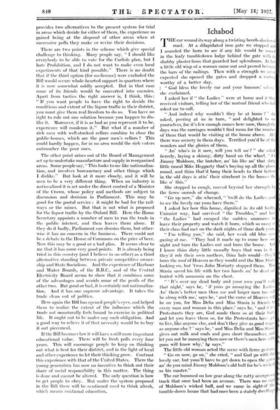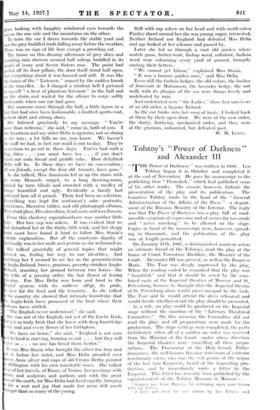Ichabod
THE car wound its way along a twisting beech-shadowed road. At a dilapidated iron gate we stopped and I sounded the horn to see if any life would be roused in the leafy tumbledown lodge behind the gate with its shabby plaster lions that guarded lost splendours. At last a little old wisp of a woman came out and peered between the bars of the railings. Then with a strength we neve expected she opened the gates and dropped a curtse) worthy of a better day.
" God bless the lovely car and your honours' selves; she exclaimed.
I asked her if " the Ladies " were at home and if they received visitors, telling her of the mutual friend who ha asked me to call.
" And indeed why wouldn't they be at home ? sh asked, peering at us in turn, " and delighted to see yourselves, for it's few enough comes here now, though the days was the carriages wouldn't find room for the nuntlx of them that would be visiting at the house above. All there was scenery in them days. Terrified you'd be at the wonders and the glories of them.
" An' who's in it now, will you tell nil f " she asked fiercely, laying a skinny, dirty hand on the wheel, " it Jimmy Muldoon, the butcher, an' his like an' that dirty little rascal Mike Heggarty that's buying up all the place round, and thim that'd hang their heads to their hotter, in the old days is atin' their stirabout in the houses th like o' this."
She stopped to cough, moved beyond her strength 10 the fierce onrush of change.
" Go up now," she wheezed, " 'twill do the Ladies good to see the lovely car yous have there."
I asked her how this house, dignified in its old Mull) Unionist way, had survived " the Troubles," .and ho " the Ladies " had escaped the sudden summons t leave their property and watch it burn, which so ninny o their class had met on the dark nights of those dark year " I'm telling you," she said, her weak old blue eye gazing at me. " They had it made up to come here on night and turn the Ladies out and burn the house. An I know thim dirty little rascally boys that was in it— they'd rob their own mothers, thim lads would—they burn the roof of Heaven so they would and the Man Ahoy looking on, but 'twas John Moriarty stopped them. Miss Stasia saved his life with her two hands ft11' he dean] al buried with ammonia on the chest.
" It's over my dead body and your own you'll wal that night,' says he, ' if yous go annoying the Ladies An' there's better men than me and larger men too wi be along with me,' says he, ' and the curse of Heaven will be on you, for Miss Delia and Miss Stasia is friends t every man and woman in this place,' says he, ' and if it Protestants they are, God made them so at their hie and let you leave them so, for the Protestants have got to live, like anyone else, and don't they give as good wag(' as anyone else ? ' says he, ' and Miss Delia and Miss Stasis gives out milk and coals and goes short themselves, all let you not be annoying them now or there's men here wit guns will know why,' ht says."
The little old woman acted the scene with fierce gesture " Go on now, go on," she cried, " and God go with th lovely car, but yous'll have to get down to open the got' an' do you mind Jimmy Muldoon's old bull for he's wick,. as his master."
The car hummed on low gear along the rutty Overgrow track that once had been an avenue. There was no sign of Muldoon's wicked bull, and we came in sight of the tumble-down house that had once been- a stately dwelling• place looking with haughty windowed eyes towards the sea on the one side and the mountains on the other.
To turn the car I drove towards the stable yard and saw the grey huddled roofs falling away before the weather. There was no sign of life here except a prowling cat.
The house on this dreamy afternoon of grey skies and scudding rain showers seemed half asleep, huddled in its shawl of ivory and Seven Sisters rose. The paint had peeled off its door pillars, the door itself stood half open, but everything about it was housed and still. It was like the house of the " Listeners " roused by the sudden knock of the traveller. As I clanged a strident bell I pictured to myself " a host of phantom listeners " in the hall and on the stairs and waited for the silence to surge softly backwards when our car had gone.
But someone came through the hall, a little figure in a hat that had once been fashionable, a knitted sports coat, a short skirt and strong shoes.
She listened graciously to any message. " You're more than Welcome," she said, " come in, both of you. I ant Anastasia and my sister Delia is upstairs, not so strong as she was ; a lot falls on me, you know. We haven't the staff we had, in fact our maid is out to-day. They're so anxious to go out in these days. You've had such a ong drive . . . you must have tea . . . if you don't mind our soda bread and griddle cake. How delighted Delia will be. In these days we have no conversation; all our friends, except the dear old tenants, have gone."
As she talked, Miss Anastasia led us up the stairs with 5 worn Brussels carpet, to a long drawing-room, haded by torn blinds and crowded with a medley of hings beautiful and ugly. Evidently a family had athered here all it prized. There had been no selection. Everything was kept for sentiment's sake—portraits, Miatures, Sheraton tables, and old photograph albums, Vaterford glass, Dresden china, bead mats and wax flowers.
From this shadowy superabundance rose another little ady. Her lace cap was askew. It was evident that we ad disturbed her at the thirty-fifth wink, and her sleepy rain must have found it hard to follow Miss Stasia's roluble explanation. But all the courteous dignity of ter family was in her smile and gesture as she welcomed us.
She talked gracefully of general topics that might iterest us, feeling her way to our identities. And atching her I seemed to see her as the personification f Anglo-Ireland, brave, gracious, poverty-stricken Anglo- reload, standing her ground between two forces—the Inc relic of a passing order, the last flower of feudal hivalry. For Miss Delia was born and bred in the cudal system with its noblesse oblige, its pride, is love for the land and the tenantry. As she talked f the country she showed that intimate knowledge that he Anglo-Irish have possessed of the land where their orhears have settled.
" The English never understood," she said.
She was not of the English, nor yet of the Gaelic Irish, ut yet so truly Irish that she knew with deep knowledge verY soul and every flower of her birthplace.
" We have no home," she said, " England is not ours d Ireland is starving, burning us out . . . but they will egret us . . . no one has loved them better."
It was Miss Stasia who brought the silver tea tray and ut it before her sister, and Miss Delia presided over een Anne silver and cups of old Crown Derby painted Y Billington with his own inimitable roses. She talked us of her travels, of Rome, of Venice, her meetings with. 'lists and sculptors and authors and with the great es of the earth, for Miss Delia had lived eagerly, bringing life a zest and joy that made her seem still much °unger than so many of the young. Still with cap askew on her head and with moth-eaten Paisley shawl around her she was young, eager, interested. Neither Ireland nor England had defeated Miss Delia and age looked at her askance and passed by.
Later she led us through a vast old garden where seutch grass, butter-wort, bishop weed, coltsfoot, fuchsia weed were colonizing every yard of ground, hungrily ousting their betters.
" We cannot get labour," explained Miss Stasia.
" It was a famous garden once," said Miss Delia.
Even still the fuchsia hedges, the old cedars, the bushes of Souvenir de Malmaison, the lavender hedge, the nut walk with its glimpse of the sea were things lovely and undefeated by ruin.
And undefeated were " the Ladies," those last survivors of an old order, a bygone Ireland.
As the car broke into her song of haste, I looked back at them by their open door. We were of the new order, the dusty, hurrying, mechanical order, and they were of the gracious, unhurried, but defeated past.
W. M. Lim's.



























































 Previous page
Previous page